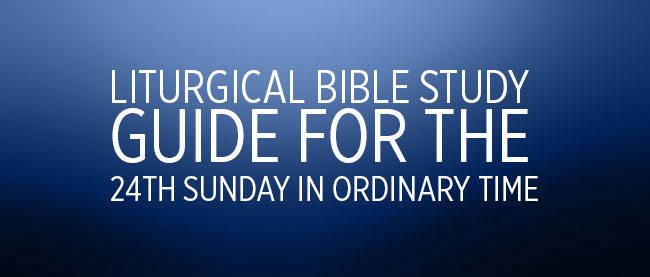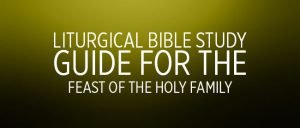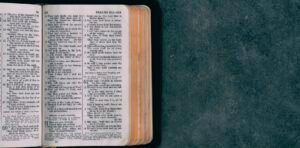1st Reading – Exodus 32:7-11, 13-14
As we begin our Old Testament study for today, we find ourselves with Moses at Mount Sinai (Horeb). Upon their arrival at Mt. Sinai, God told Moses “Thus you shall say to the house of Jacob, and tell the people of Israel: You have seen what I did to the Egyptians, and how I bore you on eagle’s wings and brought you to myself. Now therefore, if you will obey my voice and keep my covenant, you shall be my own possession among all peoples, for all the earth is mine, and you shall be to me a kingdom of priests and a holy nation. These are the words which you shall speak to the children of Israel.” (Exodus 19:3-6, RSV)
Moses then told the elders of the people this message and all the people responded “We will do everything the Lord has said.” Moses delivered their message to God, and God told him to consecrate the people, have them wash their clothes, and be ready on the third day because at that time God will come down on Mt. Sinai in sight of the people; an event to be announced by a trumpet blast.
Moses told the people all this and told them that in preparation for the third day they were to abstain from sexual relations.
On the morning of the appointed day, a thick cloud was over the mountain and a loud trumpet blast sounded. The people could not go up on the mountain to see God, presumably because they had not abstained.
God then gave the ten commandments. Moses then went to the mountain and God gave him instructions on the treatment of Hebrew servants, justice for personal injuries, protection of property, social responsibility, etc. Then God said:
“Behold, I send an angel before you, to guard you on the way and to bring you to the place which I have prepared. Give heed to him and hearken to his voice, do not rebel against him, for he will not pardon your transgression; for my name is in him. But if you harken attentively to his voice and do all that I say, then I will be an enemy to your enemies and an adversary to your adversaries. When my angel goes before you, and brings you in to the Amorites, and the Hittites, and the Perizzites, and the Canaanites, the Hivites, and the Jebusites, and I blot them out, you shall not bow down to their gods, nor serve them, nor do according to their works, but you shall utterly overthrow them and break their pillars to pieces. You shall serve the Lord your God, and I will bless your bread and your water; and I will take sickness away from the midst of you. None shall cast her young or be barren in your land; I will fulfill the number of your days. I will send my terror before you, and will throw into confusion all the people against whom you shall come, and I will make all your enemies turn their backs to you. And I will send hornets before you, which shall drive out Hivite, Canaanite, and Hittite from before you. I will not drive them out from before you in one year, lest the land become desolate and the wild beasts multiply against you. Little by little I will drive them out from before you, until you are increased and possess the land. And I will set your bounds from the Red Sea to the sea of the Philistines, and from the wilderness to the Euphrates; for I will deliver the inhabitants of the land into your hand, and you shall drive them out before you. You shall make no covenant with them or with their gods. They shall not dwell in your land, lest they make you sin against me; for if you serve their gods, it will surely be a snare to you.” (Exodus 23:20-33, RSV)
“Moses came and told the people all the words of the Lord and all the ordinances; and all the people answered with one voice, and said, ‘All the words which the Lord has spoken we will do.’ And Moses wrote all the words of the Lord. And he rose early in the morning, and built an altar at the foot of the mountain, and twelve pillars, according to the twelve tribes of Israel. And he sent young men of the people of Israel, who offered burnt offerings and sacrificed peace offerings of oxen to the Lord. And Moses took half of the blood and put it in basins, and half of the blood he threw against the altar. Then he took the book of the covenant, and read it in the hearing of the people; and they said, ‘All that the Lord has spoken we will do, and we will be obedient.’ And Moses took the blood and threw it upon the people, and said, ‘Behold the blood of the covenant which the Lord has made with you in accordance with all these words.’ Then Moses and Aaron, Nadab, and Abihu, and seventy of the elders of Israel went up, and they saw the God of Israel.” (Exodus 24:3-10, RSV)
Then Moses went up the mountain and entered the cloud where he stayed for forty days and forty nights during which time he received instructions on construction of the tabernacle, ark of the covenant, priestly garments, altars for incense and burnt offering, oil for anointing, etc. Then God gave Moses the two tablets containing the ten commandments, tablets which were written on both sides (Exodus 32:15). Our reading for today occurs after Moses has received the tablets and before he has descended from the mountain. While Moses was up on the mountain, the people have prevailed upon Aaron to fashion the golden calf and they have worshiped it.
2nd Reading – 1 Timothy 1:12-17
Having breezed through Philemon last week (this letter also appears on Thursday of the 32nd Week in Ordinary Time, Cycle 2) we move on to 1st Timothy. We will spend three weeks in 1st Timothy and then four weeks in 2nd Timothy.
Paul’s two letters to Timothy are called pastoral letters because they are written to the pastor of the church at Ephesus. They contain a series of rules and recommendations for the good government of the community, whose members are mostly of gentile background.
St. Paul was worried about the damage being done by false teachers and wanted to help the pastor carry out his serious responsibility of guiding his flock. The first letter, which we hear from today, was written from Macedonia around A.D. 66.
Gospel – Luke 15:1-32
Our gospel reading today encompasses all of Chapter 15 of Luke’s gospel and consists of three parables in which Luke champions the theme that God’s mercy breaks through all human restrictions of how God should act toward sinners. God’s mercy, indeed, is as foolish as a shepherd who abandons 99 sheep to save one, as a woman who turns her house upside down to recover a paltry sum, and as a Jewish father who joyfully welcomes home his wasteful son who has become a Gentile. Because the disciples have such a merciful God, they can embark trustingly and joyfully on Jesus’ way to this God. If the parable of the prodigal son sounds familiar, it is because you last heard it the 4th Sunday in Lent (Cycle C).





